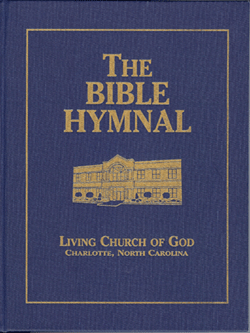Early Christians Sang Psalms

The Hymnal of the Living Church of God Consists Mainly of Psalms and Biblical Passages Set to Music
Having attended both Roman Catholic and Protestant church services while growing up, one of the things I noticed that was different about the true Church of God was the type of hymns that were sung.
While Catholics and Protestants tended to sing songs that had religious messages, the old Worldwide Church of God (and the current Living Church of God) mainly sung hymns which were extracted from the Psalms in the Bible.
And while we have been criticized for that (see Praises to Jesus Christ or Biblical Hymns: Which Should Christians Primarily Sing?), the fact is that the practice of the Living Church of God (and the old Worldwide Church of God) appears to be the same as those of the earliest professors of Christ.
The Book of James teaches:
Is anyone cheerful? Let him sing psalms (James 5:13).
The Apostle Paul noted:
Whenever you come together, each of you has a psalm (1 Corinthians 14:26).
The noted historian K.S. Latourette observed:
From a very early date, perhaps from the beginning, Christians employed in their services the psalms found in the Jewish Scriptures, the Christian Old Testament. Since the first Christians were predominantly Greek-speaking, these psalms were in a Greek translation. We hear of at least one form of service in which, after the reading from the Old Testament, the “hymns of David” were sung…Until the end of the fourth century, in the services of the Catholic Church only the Old Testament Psalms and the hymns or canticles from the New Testament were sung…Gradually there were prepared versical paraphrases (Latourette K.S. A History of Christianity, Volume 1: Beginnings to 1500. Harper Collins, San Francisco, 1975, pp. 206,207).
Because of fears of gnostic influence, Christians did not add outside poetic phrases or non-biblical lyrics until well after the second century (Ibid).
On the Roman date of 7 March 203, Tertullian records that while being prepared for martyrdom:
Perpetua sang psalms (Tertullian. Excerpted from Ante-Nicene Fathers, Volume 3. Edited by Alexander Roberts and James Donaldson. American Edition, 1885. Online Edition Copyright © 2004 by K. Knight).
Here is a quote from a fourth century publication known as the Apostolic Constitutions :
Be not careless of yourselves, neither deprive your Saviour of His own members, neither divide His body nor disperse His members, neither prefer the occasions of this life to the word of God; but assemble yourselves together every day, morning and evening, singing psalms and praying in the Lord’s house: in the morning saying the sixty-second Psalm, and in the evening the hundred and fortieth, but principally on the Sabbath-day. And on the day of our Lord’s resurrection, which is the Lord’s day, meet more diligently, sending praise to God that made the universe by Jesus, and sent Him to us, and condescended to let Him suffer, and raised Him from the dead (Apostolic Constitutions (Book II, Chapter LIX). Excerpted from Ante-Nicene Fathers, Volume 7. Edited by Alexander Roberts & James Donaldson. American Edition, 1886. Online Edition Copyright © 2005 by K. Knight).
Isn’t this astounding? Even in the Church that was ruled by Rome, psalms were mainly sang on the Sabbath. This is most likely due to the continuance of the practice that the early (before Rome increased its influence) church had.
It appears likely that the Sunday practice of singing songs of praise to God ultimately led to the practice of shifting the primacy of psalm singing to praises towards Jesus in what we now consider to be the Protestant world (as they got Sunday from the Romans).A recent book on early biblical and church practices states:
Modern New Testament scholarship is studying extensively the early church in its relationship to Judaism. It is certainly without question that Judaism is Christianity’s mother religion…
The Book of Psalms, as the temple hymnbook, continued to be used in Jewish congregations as well as Christian congregations (Roberts T. From Sacral Kingship to Sacred Marriage: A Theological Analysis of Literary Borrowing. Vantage Press. New York, 2003, pp.138-139).
Hence evidence does support the idea that psalms were the main types of hymns that the early Christians sang on the Sabbath (as that is when the early Christians, did in fact meet–Sunday worship is not alluded to in any historical literature prior to the 2nd Century–and the first clear mention of Sunday worship was by Justin Martyr: A Saint, Heretic or Apostate?).
The songbook of the Living Church of God is almost exclusively English-translations of the Book of Psalms and other parts of the Bible set to music.
In non-English speaking areas, Living Church of God congregations basically sing the same hymns translated into other languages such as Spanish, French, German, etc.
Three articles of possibly related interest may include:
Praises to Jesus Christ or Biblical Hymns: Which Should Christians Primarily Sing? This biblical article on music is in response to an advertisement critical of WCG’s 1974 The Bible Hymnal. It also address early church practices here.
The History of Early Christianity Are you aware that what most people believe is not what truly happened to the true Christian church? Do you know where the early church was based? Do you know what were the doctrines of the early church? Is your faith really based upon the truth or compromise?
There are Many COGs: Why Support the Living Church of God? This is an article for those who wish to more easily sort out the different Church of God groups. It really should be a MUST READ for current and former WCG members or any interested in supporting the faithful church. It also explains a lot of what the COGs are all about.
 |
Tweet |
|